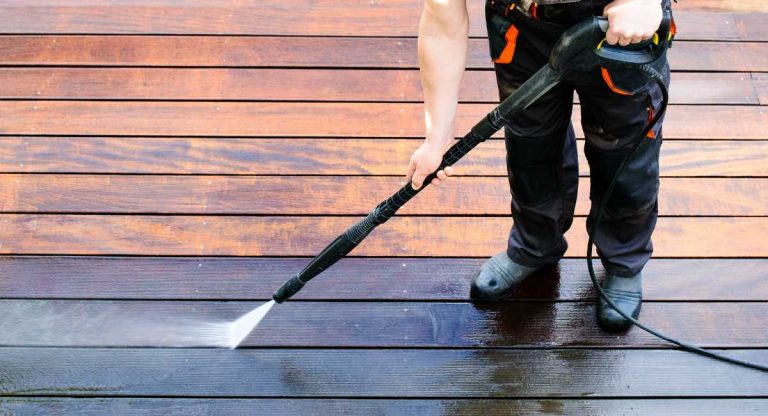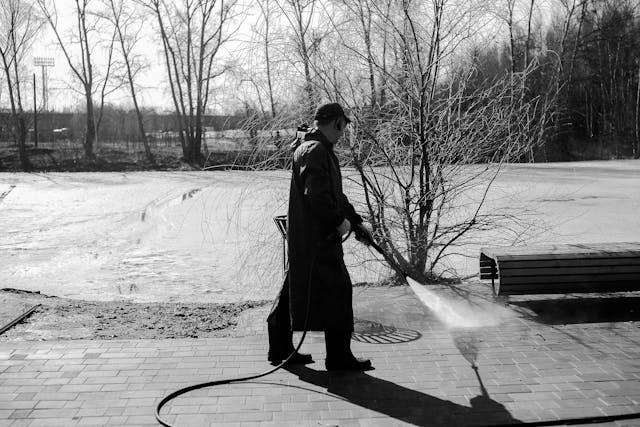
Hiring a power washing contractor without a site visit is a lot like buying a car without a test drive — you’re going in blind. 🧼 Whether you’re a homeowner cleaning your driveway or a commercial manager handling a multi-structure facility, a proper site visit is critical to getting an accurate quote, the right service, and professional results.
So why is this step so often skipped? And what should you expect when a contractor visits your property?
Let’s dig into why a walk-through is a must, not a maybe.
👀 Why a Site Visit Matters
There’s only so much a contractor can see in photos or Google Street View. A site visit allows them to evaluate the actual surfaces, spot potential obstacles, and understand your specific needs. It’s your opportunity to make sure you’re on the same page — before money changes hands.
Key Benefits of a Site Visit:
✅ Accurate estimates (no pricing surprises later)
✅ Identification of problem areas (mold, grease, cracks)
✅ Assessment of water access, drainage, and runoff control
✅ Evaluation of surrounding landscaping, surfaces, and materials
✅ Opportunity to ask detailed questions in person
A 20-minute site visit can save hours of headache, miscommunication, and even property damage. 🧠
🧽 What a Contractor Should Look For
A true professional won’t just glance at the driveway and leave. During the site visit, they should walk the property with you, ask smart questions, and take notes or photos. Here’s what they’re typically assessing:
1. Surface Types
Are you dealing with concrete, vinyl siding, brick, wood, metal, stucco, or painted surfaces? Each requires different water pressure and cleaning solutions.
2. Stain Severity
Is it mildew, algae, grease, or rust? Certain stains require specialty treatments and additional labor.
3. Accessibility
Is there easy access for hoses, ladders, and equipment? Will areas like second stories, rooftops, or narrow alleyways require lifts or scaffolding?
4. Water Supply and Drainage
Do you have an exterior water hookup? Will the runoff affect neighbors, landscaping, or public drains?
5. Nearby Hazards
This includes fragile glass, outdoor décor, garden beds, or electrical outlets that need protection during the cleaning. ⚡🌿
💬 Questions You Should Ask During the Visit
The site visit isn’t just for the contractor — it’s your chance to assess their professionalism. Use the opportunity to ask:
- What cleaning method will you use here: soft wash, high-pressure, or hot water?
- Are your cleaning agents safe for pets, plants, or children? 🐾🌱
- How will you protect windows, vents, or electrical boxes?
- Can you remove this specific stain (show them the issue)?
- Do you include gutter cleaning, sealing, or post-wash treatments?
A contractor who rushes through or avoids questions is a red flag. 🚩
Browse Amazon Here For Popular Pressure Washers And Accessories
📸 Why Photos or Phone Quotes Aren’t Enough
It’s tempting to just send over a few cell phone pics or get a quote over the phone — especially for busy homeowners or managers. But even the clearest photo can’t show:
- Hidden mold or mildew growth
- Subtle cracks or damaged surfaces
- Drainage patterns
- Elevated or obstructed access
- Nearby sensitive materials or electronics
This often leads to bait-and-switch pricing, where you’re quoted one price online but told it’ll cost more once they arrive. A site visit protects you and your wallet. 💰
📅 When Should the Visit Happen?
Ideally, the site visit should take place before you receive a final quote or sign a contract. Some reputable companies offer virtual consultations as a first step but will follow up with an in-person walk-through before committing to pricing.
✅ Bonus: A good contractor will also provide a written quote or proposal after the visit, outlining exactly what’s included.
🛡️ Liability, Insurance, and the Site Visit
One of the most overlooked reasons for a site visit is risk management. If the contractor fails to evaluate your property and causes damage (to siding, landscaping, or paint), it could create a legal or insurance nightmare.
A proper walk-through ensures:
- They understand fragile areas
- They plan for proper water reclamation and runoff
- They know how to avoid disturbing nearby businesses or neighbors
- They document pre-existing conditions in case of disputes
👷♀️ What a Good Site Visit Looks Like
Here’s a quick visual of what a professional contractor does during a visit:
| Step | What It Includes |
|---|---|
| 👋 Introduction | Arrives on time, introduces themselves, and discusses scope |
| 🚶 Walkthrough | Asks questions, evaluates surfaces, identifies concerns |
| 📸 Documentation | Takes photos of the areas to be cleaned |
| 📋 Quote Prep | Takes notes for a formal estimate |
| 💬 Q&A | Answers your questions clearly and confidently |
| 📆 Scheduling | Offers possible service dates and timeline |
If they don’t check most of these boxes, keep shopping. ✅
❌ What Happens If You Skip the Site Visit?
- You get an inaccurate quote
- Your surfaces may get damaged by incorrect pressure or chemicals
- Access issues cause job delays or rescheduling
- Unclear expectations lead to unsatisfactory results
- No documentation if disputes arise after cleaning
The cost of skipping a visit almost always outweighs the time it saves. 🕒
💡 Final Thoughts
A site visit isn’t a formality—it’s a critical part of hiring a power washing contractor. It ensures clear communication, protects your property, and sets realistic expectations on both sides. 🤝
Whether you’re cleaning a home, storefront, warehouse, or entire complex, don’t skip this step. A trustworthy contractor will insist on it—and you’ll be glad they did.
Browse Amazon Here For Popular Pressure Washers And Accessories






